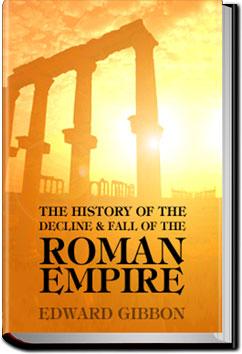UNLIMITED Audiobooks and eBooks
Over 40,000 books & works on all major devices
Get ALL YOU CAN for FREE for 30 days!
History of Decline of Roman Empire - Vol 2
Edward Gibbon
Book Overview:
The History of The Decline and Fall of the Roman Empire, a major literary achievement of the 18th century published in six volumes, was written by the celebrated English historian Edward Gibbon.
The books cover the period of the Roman Empire after Marcus Aurelius, from just before 180 to 1453 and beyond, concluding in 1590. They take as their material the behavior and decisions that led to the decay and eventual fall of the Roman Empire in the East and West, offering an explanation for why the Roman Empire fell.
Gibbon is sometimes called the first “modern historian of ancient Rome.” By virtue of its mostly objective approach and highly accurate use of reference material, Gibbon’s work was adopted as a model for the methodologies of 19th and 20th century historians.
The History of The Decline and Fall of the Roman Empire, a major literary achievement of the 18th century published in six volumes, was written by the celebrated English historian Edward Gibbon.
The books cover the period of the Roman Empire after Marcus Aurelius, from just before 180 to 1453 and beyond, concluding in 1590. They take as their material the behavior and decisions that led to the decay and eventual fall of the Roman Empire in the East and West, offering an explanation for why the Roman Empire fell.
Gibbon is sometimes called the first “modern historian of ancient Rome.” By virtue of its mostly objective approach and highly accurate use of reference material, Gibbon’s work was adopted as a model for the methodologies of 19th and 20th century historians.
How does All You Can Books work?
All You Can Books gives you UNLIMITED access to over 40,000 Audiobooks, eBooks, and Foreign Language courses. Download as many audiobooks, ebooks, language audio courses, and language e-workbooks as you want during the FREE trial and it's all yours to keep even if you cancel during the FREE trial. The service works on any major device including computers, smartphones, music players, e-readers, and tablets. You can try the service for FREE for 30 days then it's just $19.99 per month after that. So for the price everyone else charges for just 1 book, we offer you UNLIMITED audio books, e-books and language courses to download and enjoy as you please. No restrictions.
Try now for FREE!

"Love your service - thanks so much for what you do!"
- Customer Cathryn Mazer
"I did not realize that you would have so many audio books I would enjoy"
- Customer Sharon Morrison
"For all my fellow Audio Book & E-Book regulars:
This is about as close to nirvana as I have found!"
- Twitter post from @bobbyekat



Community Reviews
Let's be very clear about one thing: if you write English prose, and if you read a lot and care about English prose, you should read Gibbon. His sentences are perfect. Each is carefully weighted, pulling the reader through like a kind of perpetual motion machine; the syntax and the content are perfe
It speaks to the genius of Gibbon, and the grandeur of this work, that there are no historians or social scientists who call themselves ‘Gibbonians’. There are Marxists, Freudians, Foucaultians; there are postcolonial theorists, gender theorists, post-structuralist theorists; there are positivists,
This is a book that has grown on me. The first time I picked it up, I probably didn't make it past the tenth page. Now I'm halfway through volume 1 and totally hooked. I've found the section that I'm currently reading (about the early history of Christianity) a bit dull, but interesting: many of Nie
One of the monuments of the Enlightenment and one of the greatest works of history in English, Gibbon's iconic Decline and Fall is a pleasure to read and a treasure chest of information. While it is true that it was written before the end of the 18th century and there have been 1000s of archeologica
The Decline and Fall of the Roman Empire by Edward Gibbon (Volume One) is a classic, definitive, heavy, credible account of this period of antiquity. Initially, I was wary of embarking on this six-volume epic as Gibbon was strutting his stuff all the way back in the 1700’s. For this reason, I expect
اضمحلال الإمبراطورية الرومانية وسقوطها
بحثت عن هذا الكتاب طويلاً، وقنعت أخيراً أن اقرأ الكترونياً هذه النسخة المختصرة منه، تقع النسخة التي كتبها إدوارد جيبون في ستة مجلدات، قام المؤرخ (دي. إم لو) باختصارها في ثلاثة مجلدات، حاذفاً الكثير من الفصول مشيراً في ملخص سريع إلى أهم ما تضمنته الفصول المحذوفة
Every Empire eventually falls. Given the largest modern Empire is the United States, it might behoove Americans to read this.
The epic series is a must read for historical buffs. The premise that Christianity played a large role in the collapse of the Roman Empire might not go over well, but the lack